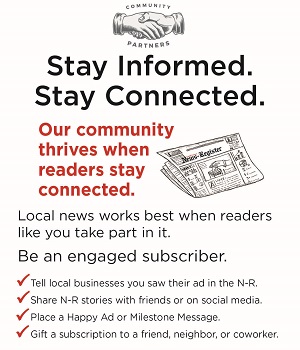Ossie Bladine: Will a third party emerge?
It seems warnings from the Founding Fathers about a two-party system have materialized, at least to a slight majority of Americans.
John Adams said: “There is nothing which I dread so much as a division of the republic into two great parties, each arranged under its leader, and concerting measures in opposition to each other. This, in my humble apprehension, is to be dreaded as the greatest political evil under our Constitution.”
The most recent Gallup poll on the issue states that 57 percent of Americans believe a third major party is needed, while 37 percent disagree. Those numbers have been pretty constant over the past 15 years, except during presidential election periods. In both 2008 and 2012, Americans against the two-party system were in the minority. Because of the historic unfavorable ratings of the elections’ major party candidates, the number of Americans clamoring for a third party has been steady.
Americans on both sides wait to see the impact that third party candidates, Libertarian Gary Johnson, and Green Party’s Jill Stein, will have on the election. Following the election — as one side hyperbolizes the freefall America will certainly endure with its new leader — I’ll be interested to see if calls continue for a third party. If they do, the most likely candidate at the moment is the Libertarian party.
Party insecurity has been a theme of the 2016 POTUS election from the beginning. Donald Trump has thrown a grenade in the GOP; meanwhile, Hillary Clinton continues to fight for votes from Bernie Sanders supporters who divided the Democratic party during the primary.
What was discussed little is how the exact same thing occurred within the Libertarian Party.
In May, I unexpectedly became glued to C-SPAN and coverage of the LP’s primary convention. Johnson, the 2012 nominee, entered trying not only to win the presidential nomination, but also to push through his choice for vice president (the LP nominates the two members of the ticket separately), Bill Weld, a former Republican governor like Johnson.
Johnson may be known to many across the nation as the zany Libertarian with a radical platform to kill the IRS and privatize schools and prisons. But at the LP convention, he was blasted by many as a statist. He was establishment. As an example of his lack of libertarian ideology, he said that driver licenses were maybe a good thing — a comment that drew a round of boos from crowd members.
(As an aside, the LP convention shared hotel space with an anime conference, which seemed fitting. The whole thing was just incredible social and political theater — from deep-hearted political philosophies to freak flags waving proudly in the name of liberty — that I wish more people would have watched. Cablehost Samantha Bee had a spot-on recap on her TBS show, if you feel inclined to get a taste of what happened.)
Of course, the LP isn’t all idealogues. In the end, the more rational block of the party celebrated the nomination of the Johnson/Weld ticket, which, despite its downward trend, still is primed to earn far more votes than any libertarian candidate has before.
“Nothing is as clear cut in governing as it might seem in philosophy,” Johnson said, while practically begging party members to make Weld his running mate. His message just barely won out.
The future of the Libertarian Party will soon be in the hands of the Millennials, which now equal Baby Boomers as the largest voting blocks. Johnson’s has continued to poll best with the under-30 crowd. But that’s not just a conclusion from the widespread dislike of Clinton and Trump.
Even before this current election cycle was underway, between one in three and one in five (depending on the poll) of Millennials identified as Libertarian. (It should also be noted those polls show Millennials are in a constant state of political identity crisis.) That is, the brand of Libertarianism promoted by the Johnson/Weld ticket, not the anarchist-side that had a loud voice at the party convention. That brand is fiscally conservative and socially accepting; and, as Weld has repeated, “Keep the government out of your pocketbook and out of your bedroom.” Their non-interventionist stance also resonates with many Americans when paired with the major party candidates.
While some Libertarians espouse the party’s takeover of statist, moderate-Republicans, those who seek legitimacy will likely feel good about the Johnson/Weld ticket’s work to mainstream the LP — despite the candidates’ shortcomings. Others, however, will call this election as nominee a missed opportunity and wonder why they didn’t try to court Ron or Rand Paul to flip to the third party.
Occasionally, you must be careful what you wish for. Many Americans are so disgusted by the two major parties that they blindly support the rise of any third party. The LP has proven in the past to be as dysfunctional and damning as the two major parties. Will increased engagement help steady the train for Libertarians, and produce a more viable ticket in 2020? If Johnson/Weld can earn five percent of the popular vote in November, the party will qualify for federal campaign funding. That would be a major boost. We’ll just wait and see.














Comments
Mike
Good question. I want to see a 3rd Party become strong enough to leverage and force the Ds and the Rs to talk, to compromise, and to work to make our world a better place. For me that means a 3rd Party that is Centralist and/or Moderate in its approach to governance and policies. We see where the extremes have taken us. There seems to be no existing political entity that gives me much hope.
bailey
Suggestion to the Editor and Assistant Publisher: consider proofreading before you put something online. Ex: "have materialize"(?); "entered the trying"(?); "Other, however,..."(?)
Don Dix
We don't need to add another party to the political system -- we do, however, need to subtract a couple! Actually increasing production by subtraction -- what a concept!